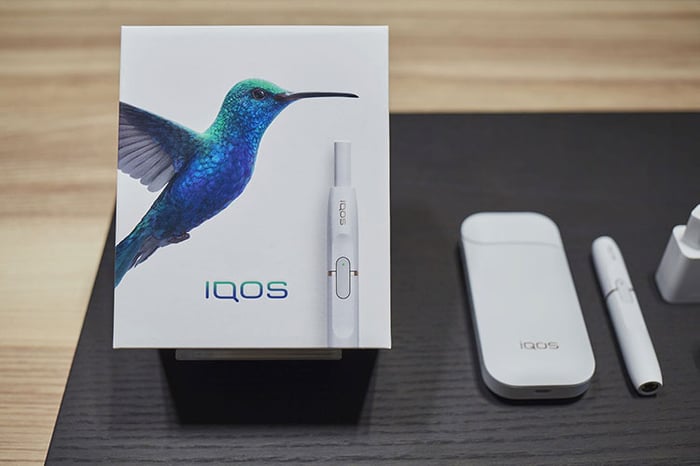Twenty years ago, cigarette maker Liggett Group upended the tobacco world when it broke ranks with the rest of the industry and agreed to settle a lawsuit with 22 states, becoming the first company to admit cigarettes were addictive and cause cancer. The decision forever changed how the tobacco industry operated.
Philip Morris International (PM 3.83%) is looking to similarly revolutionize the industry by committing to investing $1 billion in the creation of a Foundation for a Smoke-Free World to stamp out smoking. The tobacco company that generates over $26 billion a year from selling cigarettes says it wants to offer them a better option.

Image source: Getty Images.
A vapor-filled future
Philip Morris CEO Andre Calantzopoulos admits his products are harming people, but says "There is a unique opportunity today to significantly change the health trajectories of the millions of men and women who continue to smoke by offering them a better choice."
It is, of course, that "choice" that is the crux of this billion-dollar venture. It is seeking to validate electronic cigarette alternatives, especially its heat-not-burn iQOS device, and have people switch from smoking to vaping.
Needless to say, there are skeptics about what Philip Morris is trying to achieve. The tobacco company it is helping to create will receive financing from Philip Morris to the tune of $80 million a year for the next 12 years, starting in 2018. Although the cigarette maker maintains the foundation will be independent and governed by a board of directors, Philip Morris is currently its only benefactor, and it will be headed by a former World Health Organization official who has championed electronic cigarettes and other reduced-risk products. Some see potential conflicts of interest, but for Philip Morris it's really a matter of survival.
Getting ahead of the inevitable
For decades now cigarette use has been on the decline. Cigarette shipment volumes at the tobacco company fell 4.1% last year, dipping below 813 billion units. Similarly, Altria (MO 0.70%) said total cigarette shipment volume in the U.S. fell 2.5% last year to 123 billion units, while Reynolds American, which is now owned by British American Tobacco (NYSEMKT: BTI), noted that total industry domestic cigarette shipment volume fell by a similar percentage, dropping from 264 billion units to 258 billion.
Philip Morris also said net revenues, excluding excise taxes, which comprise about three-quarters of the cost of a cigarette, fell 0.4%. The only reason they weren't down more was because the cigarette maker and the other tobacco companies are able to raise prices with near impunity. In fact, Altria's Philip Morris USA division just raised the cost of a pack of cigarettes to $10 each, a $1 per pack hike that's an attempt to offset excise tax increases in California.

Image source: Philip Morris International.
Where there's smoke, there's fire
However, Philip Morris International has been a leader in developing cigarette alternatives, particularly with its heat-not-burn technology, which heats tobacco to a certain temperature where it creates a vapor -- not smoke -- that the user inhales.
It applied to the FDA to receive a reduced-risk label on its iQOS, but Philip Morris and the rest of the industry received a big push to hurry up the adoption of smoking alternatives when the regulatory agency announced in July it was considering requiring cigarettes to only contain nicotine at levels where it would not be addictive.
That may not be feasible, since according to the National Institutes of Health the typical cigarette contains 10 milligrams to 15 milligrams of nicotine, and the average smoker ingests between 1 mg to 2 mg per cigarette. It estimates as little as 0.5 mg of nicotine may be required to make cigarettes non-addictive, perhaps even less. Migrating smokers to heat-not-burn devices may be easier.
The thing about reduced-risk products (RRPs) is they're not taxed nearly as heavily as cigarettes are. In 2016, Philip Morris generated $739 million in net revenues from such devices, or $733 million excluding excise taxes. Year-to-date in 2017 it has already generated over $1 billion in sales from RRPs, excluding excise taxes.
And they're likely more profitable. According to British American Tobacco, its competing glo device generates twice the profit margin as traditional cigarettes, and as usage ramps up, costs to produce the devices will decrease, making them even more profitable.
Because governments don't tax them as heavily, however, it might not be as easy to mask price increases as tobacco companies do now with cigarettes -- but cigarette alternatives seem to address many of the issues confronting tobacco companies.
It may seem odd to see Philip Morris International actively try to stop people smoking, but that's only because it wants them to start vaping, and financing a foundation to get people to do that could ensure the cigarette giant becomes the industry leader.





